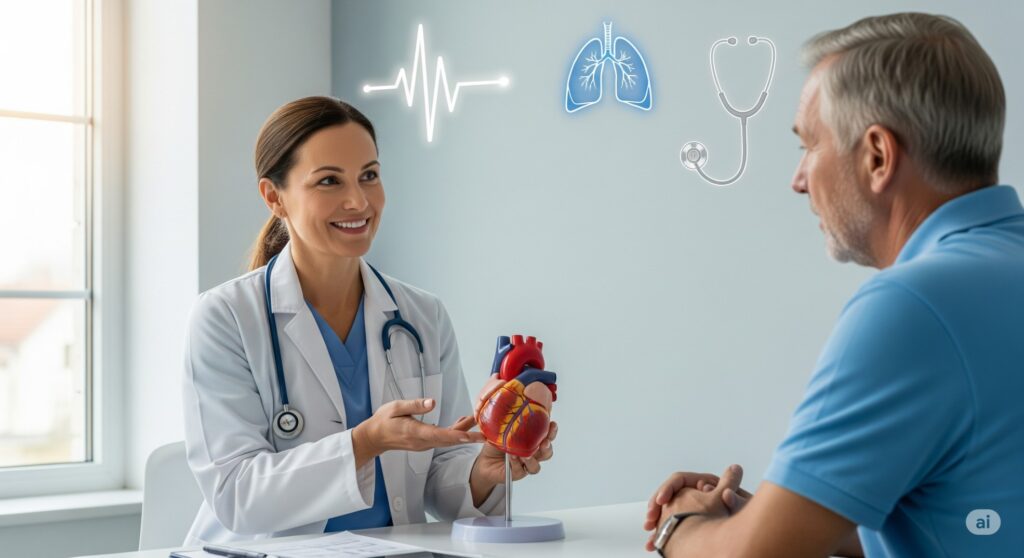
Cardiologist explaining early signs of heart disease to a patient.
A cardiologist explains 10 signs of heart disease—like irregular heartbeat, swollen feet, and jaw pain—that you should never ignore.
A cardiologist explains 10 signs of heart disease you ignore, but should not
Heart disease rarely starts with dramatic chest pain. Often, it whispers first. Subtle clues show up in your day-to-day routine. Yet we brush them off. Below, a cardiologist’s guide to 10 signs of heart disease that deserve attention—including irregular heartbeat, swollen feet, and jaw pain. If any sound familiar, talk to your doctor promptly.
1) Irregular heartbeat (palpitations)
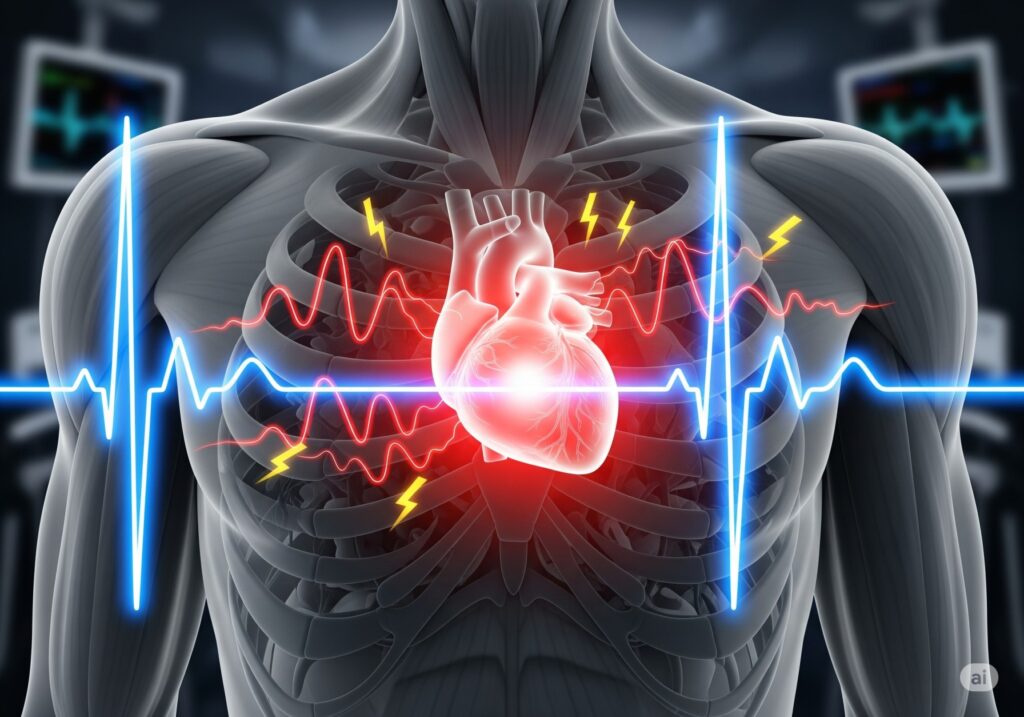
A fluttering, racing, or skipping heartbeat can feel harmless. Sometimes it is. But frequent palpitations or an irregular heartbeat may signal an arrhythmia like atrial fibrillation (AFib). AFib increases stroke risk and needs evaluation. Learn the common arrhythmia symptoms from the American Heart Association. www.heart.org
Act now: Seek care if palpitations last for minutes, happen often, or come with chest pressure, fainting, or breathlessness. Serious symptoms can mimic a heart attack. www.heart.org
2) Swollen feet and ankles
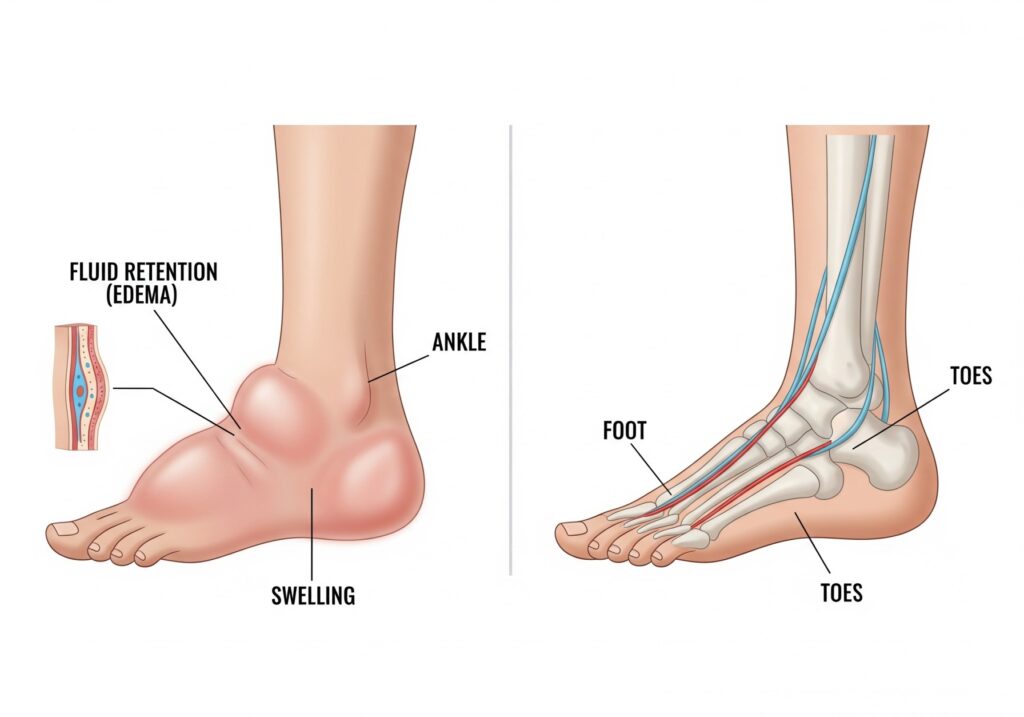
Puffy socks by evening? Fluid that pits when pressed? These can reflect peripheral edema. While many causes exist, persistent leg or ankle swelling can point to heart failure—especially right-sided failure. Review edema basics at the Cleveland Clinic and right-sided heart failure signs here: Cleveland Clinic—Right-Sided Heart Failure. Cleveland Clinic+1
Act now: Call your clinician if swelling is new, worsening, or paired with shortness of breath or sudden weight gain. Those can signal fluid overload from heart failure. Cleveland Clinic
3) Jaw pain, especially with exertion
Chest pain gets the headlines. But angina can spread to the neck or jaw. If jaw discomfort appears with activity and eases with rest, it may indicate reduced blood flow to the heart. See the AHA’s overview of angina. Women may notice jaw, back, or arm pain with unusual fatigue or nausea during a heart attack; details are here: AHA—Heart attack symptoms in women. www.heart.org+1
Act now: If jaw pain occurs with chest pressure, cold sweat, or breathlessness, call emergency services immediately. Do not drive yourself. www.heart.org
4) Shortness of breath at rest or with minimal effort
We all get winded on hills. But breathlessness during light tasks—or waking up gasping at night—can signal heart failure or an arrhythmia. If you notice a steady decline in exercise tolerance, get checked. See the symptom list for heart failure at the Cleveland Clinic. Cleveland Clinic
5) Chest pressure or tightness
This classic warning remains vital. Pressure, squeezing, or fullness in the center of the chest that lasts more than a few minutes—or comes and goes—deserves urgent attention. Pain that radiates to the arm, back, neck, or jaw is especially concerning. Review heart attack warning signs at the AHA. www.heart.org
6) Unusual fatigue
“Just tired” can be a red flag—particularly if it’s new, severe, or limits daily activity. Fatigue can accompany coronary disease, heart failure, or AFib. Women may experience unusual fatigue during a heart attack. The AHA outlines these “other signs” here: AHA—Other signs of heart attack. www.heart.org
7) Dizziness or fainting
Lightheadedness, near-fainting, or actual syncope can result from arrhythmias, valve disease, or blood pressure drops. They are not “just dehydration” if recurrent. Don’t ignore repeated episodes—especially alongside palpitations or chest discomfort. See broader signs of heart disease summarized by Mayo Clinic. Mayo Clinic
8) Persistent cough or wheeze
A dry, stubborn cough—especially when lying flat—can reflect fluid in the lungs from heart failure. Some people also notice a need to prop up with pillows at night. The Cleveland Clinic heart failure page explains these features. Cleveland Clinic
9) Nausea, cold sweat, or indigestion-like discomfort
Heart events don’t always look like a movie scene. Some people, particularly women and older adults, report nausea, breaking out in a cold sweat, or stomach discomfort during a heart attack. Don’t delay help because it “feels like indigestion.” See the AHA’s symptom list: Warning signs of a heart attack. www.heart.org
10) Sleep problems and loud snoring
Obstructive sleep apnea strains the heart and can worsen blood pressure, arrhythmias, and heart failure over time. If your partner notices loud snoring or pauses in breathing, ask about a sleep evaluation. Mayo Clinic’s overview of signs of heart disease includes when to seek care for overlapping symptoms. Mayo Clinic
When are signs of heart disease an emergency?
Call emergency services now if you have chest pressure, spreading pain (arm, back, neck, or jaw), severe breathlessness, fainting, or a rapid/irregular heartbeat with feeling unwell. Early action saves the heart muscle. The AHA details urgent red flags here: AHA—Heart attack symptoms. www.heart.org
Why these signs of heart disease are easy to miss
We rationalize subtle clues. Busy days make fatigue “normal.” Desk jobs make ankle swelling “expected.” Anxiety explains palpitations. But pattern and context matter. Symptoms that are new, persistent, worsening, or triggered by exertion require medical insight. Untreated AFib raises stroke risk; unmanaged heart failure can progress silently. See the AHA overview of arrhythmia risks: Understand your risk for arrhythmia. www.heart.org
How doctors evaluate suspected signs of heart disease
Expect a careful history and exam, plus targeted tests:
- ECG and rhythm monitoring for palpitations and fainting.
- Blood tests (e.g., troponin) are ordered if a heart attack is possible.
- Echocardiogram to assess pumping and valves.
- Stress testing or CT coronary angiography for exertional symptoms.
- Sleep study if apnea is suspected.
Your clinician will match tests to your symptoms and risk profile.
What you can do today
Small steps lower risk and help symptoms:
- Track episodes: time, trigger, duration, and accompanying signs.
- Move daily, even in short walks, unless your doctor restricts activity.
- Choose a heart-healthy plate: more plants, fiber, and unsalted foods.
- Take prescribed medications consistently.
- Know your numbers: blood pressure, LDL, A1c, and weight trend.
- If you smoke, get help to quit.
For evidence-based education, explore these hubs:
- American Heart Association—Heart Attack & Arrhythmia and Arrhythmia overview. www.heart.org+1
- Cleveland Clinic—Heart Failure & Edema and Edema. Cleveland Clinic+1
- Mayo Clinic—Heart disease symptoms. Mayo Clinic
Key takeaways
- Subtle clues often precede crises.
- Irregular heartbeat, swollen feet, and jaw pain are not normal when persistent or exertional.
- Because symptoms overlap with other conditions, timely evaluation is crucial.
- When in doubt, get checked. Acting early protects your heart.
Medical Disclaimer
This article is for educational purposes only. It is not intended to diagnose, treat, cure, or prevent any disease. The information provided should not replace professional medical advice. Always seek the guidance of your physician or other qualified healthcare provider with any questions you may have regarding your health or a medical condition. If you experience chest pain, difficulty breathing, or other emergency symptoms, call your local emergency number immediately.
Call to Action
Your heart often speaks in whispers before it cries out in pain. Don’t ignore the warning signs. Schedule a check-up with your doctor if you’ve noticed symptoms like an irregular heartbeat, swollen feet, or jaw pain. Share this article with friends and family—because recognizing the early signs of heart disease could save a life.
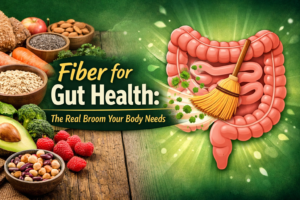
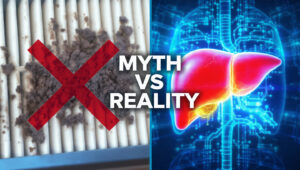




Thank you for your sharing. I am worried that I lack creative ideas. It is your article that makes me full of hope. Thank you. But, I have a question, can you help me?